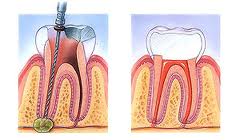In early February, one of my bottom molar teeth cracked. The tooth had an old filling in it, and I felt it crack while I was at dinner with friends. At the time, I had only been in AZ for about two months. I relocated and still don’t have a job yet, so I found a dentist with reasonable fees. She said I needed a crown. She prepared the tooth and put on a temporary crown. The crown made my gums sore, and it hurt to chew on that side of my mouth. I also told my dentist that I felt some sensitivity in the tooth whenever I drink anything cold.
That issue wasn’t resolved before she placed my permanent crown later in January. The pain got worse, so I returned to the dentist she took x-rays and poked around the crown to see if I felt any pain or pressure. Of course, my tooth didn’t respond to any of her tricks, so she told me to wait two or three months for it to settle down. My tooth hurts daily. It’s not constant pain, but it hurts and is now sensitive to hot food. I’ve entered my symptoms in Google, and everything I read sounds like I need root canal treatment. Is my tooth dying? Thank you. Eun-ae M. from Flagstaff
Eun-ae,
Thank you for describing your symptoms and the history of your tooth pain. We recommend that you call an endodontist, or root canal specialist.

But without criticizing your dentist, we want to clarify a few facts.
Causes of Tooth Pulp Irritation and Sensitivity
- Cracked tooth – A crack can easily affect the tooth pulp (living tissue, nerves, and blood vessels) inside your tooth. An infection can cause inflammation that chokes the pulp and makes it die.
- Aggressive preparation for a crown – Significant sensitivity after your dentist prepares a tooth for a crown can result from improperly sealing the temporary crown or aggressive tooth preparation. But a tooth can be coated with a desensitizing product to limit the discomfort.
- Cementing the crown – A temporary crown on a molar tooth should be made of durable material and bonded with soothing cement to help the tooth nerves calm down. Permanently cementing an already irritated tooth can cause further complications and the need for root canal treatment. The increased sensitivity you’re feeling might be due to changes in the tooth ligament near the root. An endodontist can see that, but most general dentists won’t recognize it as an issue.
Instead of allowing your general dentist to do any more work on your teeth, we recommend that you see a specialist.
This post is sponsored by Plano, TX female dentist Dr. Miranda Lacy.